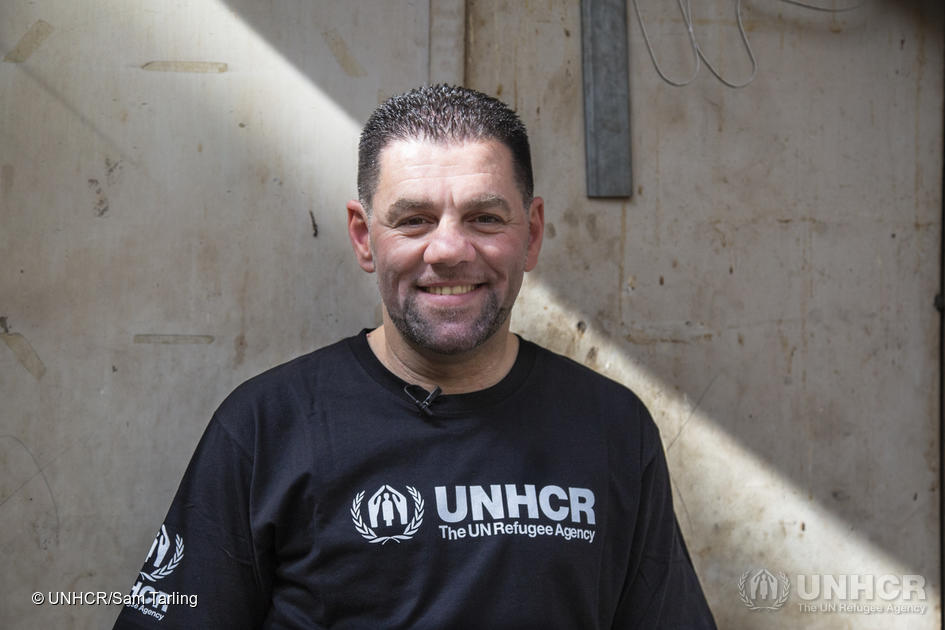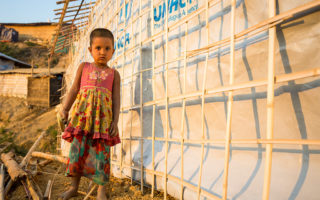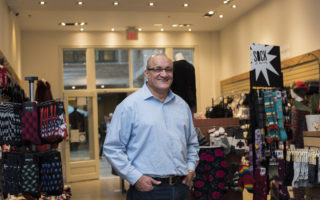
Mohamad Fakih, CEO and President of Paramount Fine Foods, stands outside a centre run by UNHCR partner Caritas in Bourj Hammoud, Beirut. © UNHCR/Sam Tarling
Written by Mohamad Fakih, CEO and President of Paramount Fine Foods
When I arrived in Canada at the age of 26, I came with a strong drive and desire to succeed.
Like many others, I immigrated for the opportunity of a better life. I was attracted to Canada’s diversity as I saw this country as a land full of opportunities.
It was by chance that I got my start in the restaurant industry with the purchase of a small Lebanese eatery, and I am proud of the work that has been put in to make Paramount Fine Foods the success it is today.
This journey is why I believe and know that refugees, as any other newcomers, are a largely untapped resource that can make Canada stronger.
Refugees are often perceived as victims depending on external support that put a strain on our social services. This is a wholly inaccurate picture.
Over the last year, I have teamed up with UNHCR — the UN Refugee Agency — and can testify first-hand that like newcomers, refugees have an entrepreneurial spirit, using their diverse skill sets and talents to start businesses and create jobs for themselves and other Canadians.
My involvement on refugee issues result from my experience at Paramount Fine Foods: We have hired more than 150 refugees and each one of them has been worth my trust.
As business leaders, we want lower turnover rates with conscientious employees who contribute to a stable core workforce for our growing companies.
Research by the Fiscal Policy Institute has found that among refugees, turnover rates are overwhelmingly lower in comparison to all other employees.
Their sense of belonging and gratitude to the employer who gave them a chance first is something I have often noticed. This should definitely inform our business models.
But let’s not be naive: Refugees are often perceived as victims depending on external support that put a strain on our social services. This is a wholly inaccurate picture.
Canada’s investment in refugees pays off. Data shared from Statistics Canada shows that the performance of refugees in the Canadian labour market improves significantly over time.
After only six years in Canada, refugees earn as much as most Canadians.
Canadians recognize that refugees are positive elements of our communities, but may not always be aware of the economic argument. This is why I reach out to my fellow business leaders to promote a better understanding of these positive outcomes and recognize that while refugees may start off with fewer resources, they demonstrate resilience and work tirelessly to build a better life.
Let me be clear: I don’t tell my franchises to hire refugees irrespective of their experience in the position. I simply tell them to give these people a chance.
It is not about their need or any sense of charity but it is about their qualifications — of which they have an abundance.
Business leaders are looking to hire dedicated, hard-working employees…human beings forced to leave their homes are looking for a job and a way to restore dignity to their life. We only need to put them together.
Half of refugees in the workforce are employed in either management and professional or college and apprenticeship training jobs.
On one side, business leaders are looking to hire dedicated, hard-working employees; on the other hand, human beings forced to leave their homes are looking for a job and a way to restore dignity to their life.
We only need to put them together.
This is my message following World Refugee Day on June 20. The theme this year was inclusion, and at a time when vitriolic hateful speech and xenophobia are drawing headlines and dominating discourse, this reminds us that there is a different narrative that needs to be told.
And hopefully, will be heard.
Mohamad Fakih is CEO of Paramount Fine Foods and chair of the Fakih Foundation
This op-ed was originally published by The Hamilton Spectator





